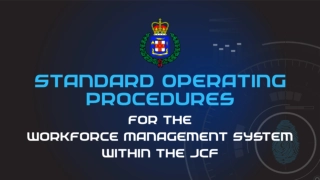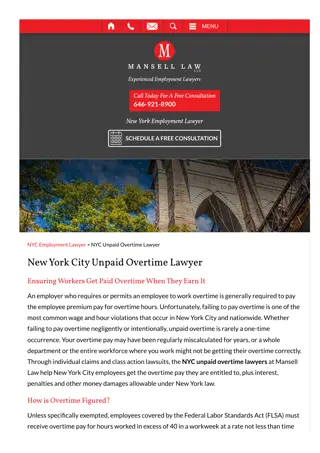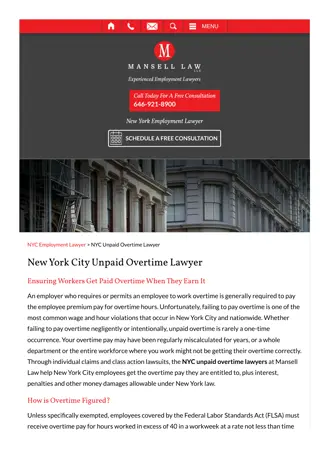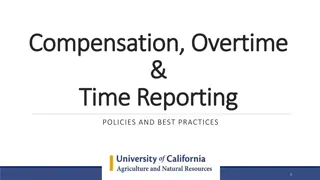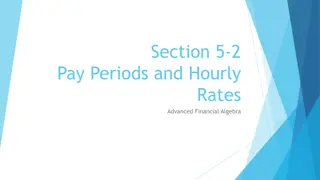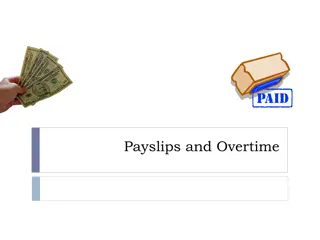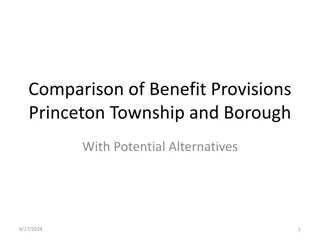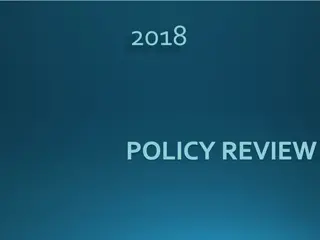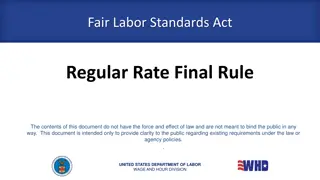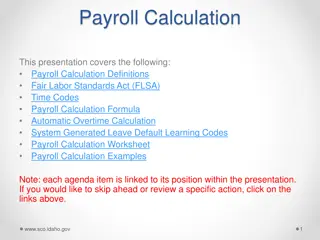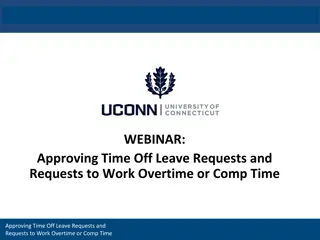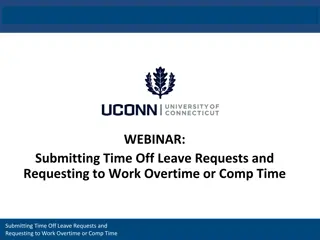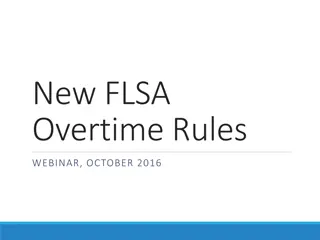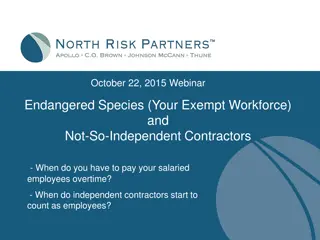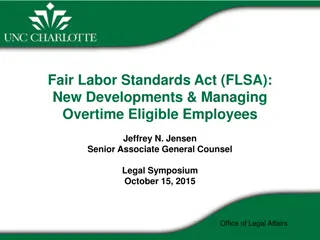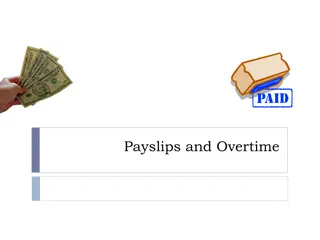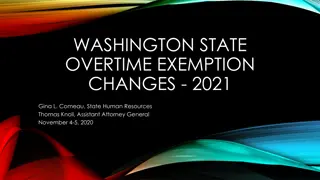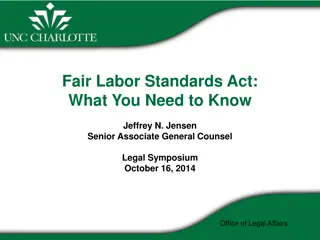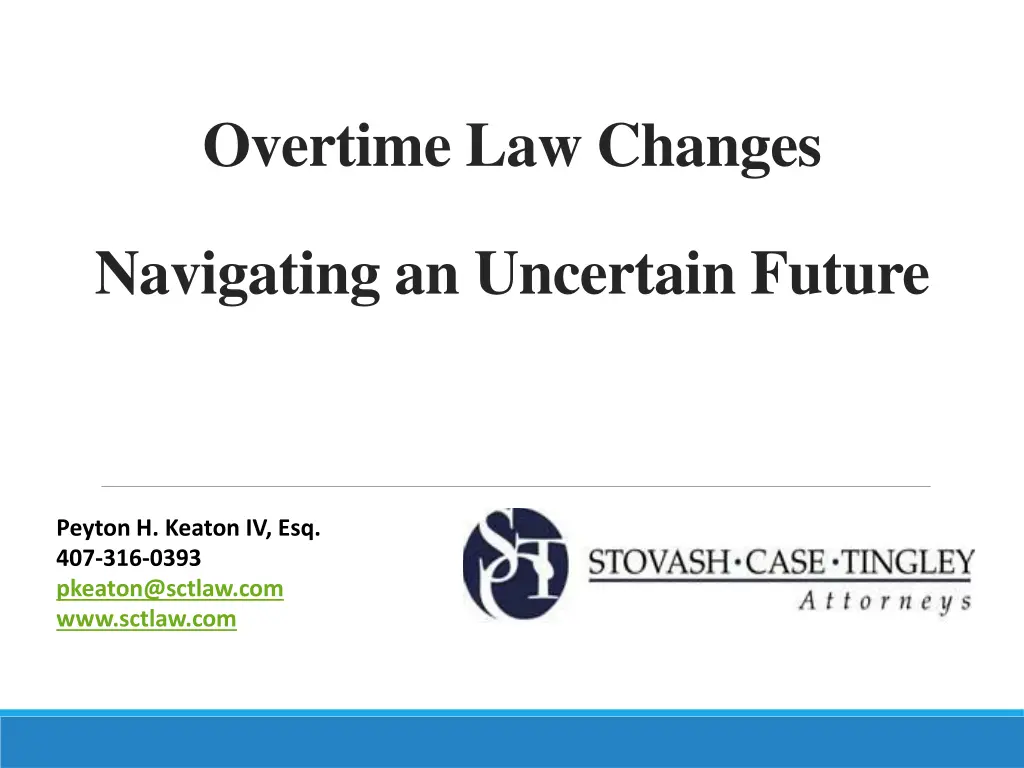
Navigating Overtime Law Changes for Employment Relationships
Explore the major provisions and FLSA exemptions related to overtime law changes. Understand the requirements for coverage, minimum wage, overtime pay, and more to ensure compliance in the employer-employee relationship amidst uncertainty.
Download Presentation

Please find below an Image/Link to download the presentation.
The content on the website is provided AS IS for your information and personal use only. It may not be sold, licensed, or shared on other websites without obtaining consent from the author. If you encounter any issues during the download, it is possible that the publisher has removed the file from their server.
You are allowed to download the files provided on this website for personal or commercial use, subject to the condition that they are used lawfully. All files are the property of their respective owners.
The content on the website is provided AS IS for your information and personal use only. It may not be sold, licensed, or shared on other websites without obtaining consent from the author.
E N D
Presentation Transcript
Overtime Law Changes Navigating an Uncertain Future Peyton H. Keaton IV, Esq. 407-316-0393 pkeaton@sctlaw.com www.sctlaw.com
Major Provisions Coverage Minimum Wage Overtime Pay Youth Employment Recordkeeping 2
Employment Relationship There must be an employment relationship between the employer and the employee. Employees vs. Independent Contractors 3
FLSA Exemptions Unless an exemption applies, employees must: Receive at least the applicable current minimum wage. (Federal Min. Wage: $7.25; Fla. Min. Wage: $8.05) Receive OT pay for hours worked over 40 in a workweek. Maintain true and accurate time records. * Exemptions are to be narrowly construed against the employer. 4
FLSA Exemptions 541 Exemptions 1. Executive 2. Administrative 3. Professional 4. Outside Sales 5. Computer Related Occupation 6. Highly compensated Remember: There is a Duties Test and Salary Basis Test *The Outside Sales exemption does not have a minimum salary requirement. 5
Executive Exemption 1. Primary duty is management of the enterprise or of a customarily recognized department or subdivision 2. Customarily and regularly directs the work of two or more other employees. 3. This includes authority to hire or fire other employees or recommendations as to the hiring, firing, advancement, promotion or other change of status of other employees given particular weight. 6
Administrative Exemption 1. Primary duty is the performance of office or non- manual work directly related to the management or general business operations of the employer or the employer s customers 2. Primary duty includes the exercise of discretion and independent judgment with respect to matters of significance. 7
Professional Exemption 1. Primary duty is the performance of work requiring knowledge of an advanced type in a field of science or learning customarily acquired by a prolonged course of specialized intellectual instruction. 2. Primary duty is the performance of work requiring invention, imagination, originality, or talent in a recognized field of artistic or creative endeavor. 8
Outside Sales Exemption 1. Primary duty is: (1) making sales, or (2) obtaining orders or contracts for services or facilities for consideration paid by customer. 2. Customarily and regularly engaged away from the employer s place(s) of business in performing such primary duty. * No Salary Requirement 9
Computer Related Occupations Primary duty is: The application of systems analysis techniques and procedures, including consulting with users, to determine hardware, software, or system functional specifications. The design, development, documentation, analysis, creation, testing, or modification of computer systems or programs, including prototypes, based on and related to user or system design specifications; The design, documentation, testing, creation or modification of computer programs related to machine operating systems A combination of the above requiring the same level of skills. 10
FLSA Exposure Sources 1. Department of Labor Compliance Review Employee Complaint Industry Review Competitor Complaint 2. Lawsuits Damages Available in FLSA Litigation Back Pay for Up to 3 Years. Liquidated Damages Attorneys Fees and Costs 11
Overview of New Regulations Effective Date. The Final Rule is effective December 1, 2016. Increase in Salary Level. The minimum salary for exempt employees more than doubles from $23,660 to $47,476 annually. Inclusion of Incentives, Commissions and Non-Discretionary Bonuses in Salary. Employers may use commissions, incentive pay and nondiscretionary bonuses to satisfy up to 10% of the new salary level. These additional payments must be made on at least a quarterly basis. 12
Overview of New Regulations Highly-Compensated Exemption. The Final Rule increases the salary threshold for highly compensated employees from $100,000 to $134,004 annually. Automatic Update Every Three Years. The minimum salary level will increase every three years with the first increase set for January 1, 2020. 13
Catch-up Payments If an employee does not earn enough from the nondiscretionary bonus, commission, or incentive payments in a given quarter to meet the standard salary level an employer may make a catch-up payment within one period of the end of the quarter. pay Any such catch-up payment will count only toward the prior quarter s salary amount and not toward the salary amount in the quarter in which it is paid. 14
Highly Compensated Employees (HCE) HCE s must continue to receive at least the full standard salary level amount ($913 per week) each pay period on a salary or fee basis without regard to the payment of nondiscretionary bonuses and incentive payments (No Change to this principle). Nondiscretionary bonuses and incentive payments (including commissions) may be counted towards the highly compensated employees total annual compensation requirement ($134,004). (No change in this principle). The HCE test does not allow employers to credit nondiscretionary bonuses or incentive payments (including commissions) towards the standard salary level weekly requirement. 15
Automatic Updates Every three years beginning January 1, 2020, the standard salary and annual compensation levels will be automatically updated. At least 150 days before the effective date, the Secretary will publish a notice in the Federal Register of the updated salary and total annual compensation amounts that will be required. 16
Updating the Standard Salary Level Standard Salary Level Updated to equal the 40th percentile of weekly earnings of full-time salaried workers in the lowest-wage Census Region. 17
Updating HCE Compensation Level Highly compensated employees updated to equal the 90th percentile of annualized earnings of full-time salaried workers nationally. 18
Salary Basis Test Regularly receives a predetermined amount of compensation each pay period (on a weekly or less frequent basis). The compensation cannot be reduced because of variations in the quality or quantity of the work performed. Need not be paid for any workweek when no work is performed. 19
Deductions from Salary An employee is not paid on a salary basis if deductions from the predetermined salary are made for absences occasioned by the employer or by the operating requirements of the businesses. If the employee is ready, willing and able to work, deductions may not be made for time when work is not available. 20
Effect of Improper Deductions An actual practice of making improper deductions from salary will result in the loss of the exemption. - During the time period in which improper deductions were made. - For employees in the same job classifications - Working for the same managers responsible for the actual improper deduction. Isolated or inadvertent improper deductions, however, will not result in the loss of exempt status if the employer reimburses the employee. 21
Safe Harbor The exemption will not be lost if the employer: Has a clearly communicated policy prohibiting improper deductions and including a complaint mechanism. Reimburses employees for any improper deductions Makes a good faith commitment to comply in the future. Unless the employer willfully violates the policy by continuing to make improper deductions after receiving employee complaints. 22
Recordkeeping The FLSA requires that all employers subject to any provision of the Act make, keep, and preserve certain records. Time clocks are not required and records need not be kept in any particular form. Nonetheless, every covered employer must keep certain records for each non-exempt worker. 23
Recordkeeping The following is a sample listing of some of the basic records that an employer must maintain: Employee s full name and social security number Address, including zip code Birthdate if younger than 19. Sex and Occupations Time/day of week employee s workweek begins Hours worked each day Total hours worked each workweek Reference: Fact Sheet 21: Recordkeeping Requirements Under the FLSA 24
Required Posting Covered employers must post a notice explaining the FLSA, as prescribed by the Wage and Hour Division, in a conspicuous place such as a lunch room or employee lounge area. Posting: Available electronically for downloading and printing at: www.dol.gov/oasam/boc/osdbu/sbrefa/poster/matrix.htm 25
Common Errors to Avoid Assuming that all employees paid a salary are not due overtime. Improperly applying an exemption Failing to pay for all hours an employee is suffered or permitted to work Limiting the number of hours employees are allowed to record. 26
Common Errors to Avoid Failing to include all pay required to be included in calculating the regular rate for overtime pay. Failing to add all hours worked in separate establishments for the same employer when calculating overtime due. Making improper deductions from wages that cut into the required minimum wage or overtime. Examples: shortages, drive-offs, damage, tools, and uniforms. Treating an employee as an independent contractor. Confusing Federal law and State law. 27
The FLSA Does Not Require Vacation, holiday, severance, or sick pay Meal or rest periods, holidays off, or vacations Premium pay for weekend or holiday work A discharge notice, reason for discharge, or immediate payment of final wages to terminated employees 28
Some Unexpected Challenges Conventional wisdom holds that there are two alternatives to address those employees below the new salary threshold: (1) increase the salary of employees below $47,476 to at least this new threshold, or (2) convert employees below the new threshold to nonexempt status and pay overtime for hours worked over 40 per week. In addition to the financial and operational impact of these changes, there may be some unexpected consequences or challenges - here is a review of some of these: 29
Some Unexpected Challenges Converting Employees to Non-Exempt Employees will now be required to maintain an accurate record of hours worked. Besides the logistics of the change, there may be a negative employee relations impact or perception of a change to his/her status. These employees will be eligible to receive overtime for hours worked over 40 in a workweek; this may result in changes to remote work policies or other flexible work arrangements that are suitable for exempt employees, but less desirable for nonexempt employees. 30
Some Unexpected Challenges Converting Employees to Non-Exempt (continued) If benefit programs, officer status or other perks are tied to an employee s exempt status, you may be required to make adjustments to these policies. Any commissions, incentive pay or nondiscretionary bonuses paid to these employees will be subject to additional overtime pay requirements. The Fluctuating Workweek Method of Pay may be a more viable option now this pay plan will permit the employer to retain the current salary level and pay overtime at a time rate instead of 1 time rate. 31
Some Unexpected Challenges Increasing Salary to the New Threshold Does increasing salary levels result in an increase in PTO, vacation or short-term leave liability? Will your matching levels for 401k or other benefits increase? 32
Some Unexpected Challenges Increasing the salary level for some employees might affect the integrity of your salary administration program. As an example, if an employee currently earning $40,000 per year is increased to $47,476 per year, what changes, if any, should be made for other employees earning slightly more say $50,000? Would the changes result in a compression of salary levels or would it cause a ripple effect by increasing salaries throughout the organization? 33
Develop a Comprehensive Plan Moving Forward We recommend that you confer with legal counsel regarding a plan to address these challenges. In addition to the benefits of attorney-client confidentiality, there is a belief that the December 1st changes may spark a new wave of FLSA lawsuits. These lawsuits may focus on what, if any, steps an employer took to comply with these changes and the good faith efforts it took to be in compliance. 34
Develop a Comprehensive Plan Moving Forward A comprehensive plan of action may include: Determining the financial impact of either increasing the salary levels of certain employees or converting these individuals to overtime eligible employees. Including revisions to pay plans, policies, benefit programs, timekeeping systems, employment agreements or handbooks as a result of these changes. 35
Develop a Comprehensive Plan Moving Forward Making sure that pay plans relying on incentives, commissions or nondiscretionary bonuses to cover up to 10% of the required salary are properly written and implemented. Assessing the impact these substantive changes will have on your employee relations and compensation programs. 36
Develop a Comprehensive Plan Moving Forward Include a communication component that will permit pay changes to be communicated to employees in a proactive and positive manner. Consider the future of salary reviews and increases given that automatic adjustments to the minimum salary level will be made every three years. 37
The End 38

